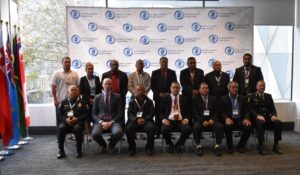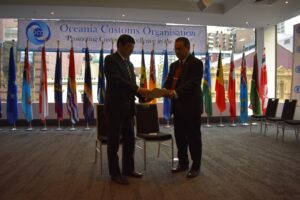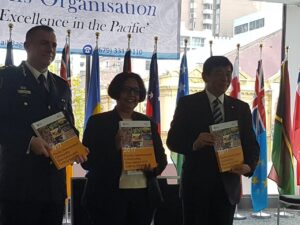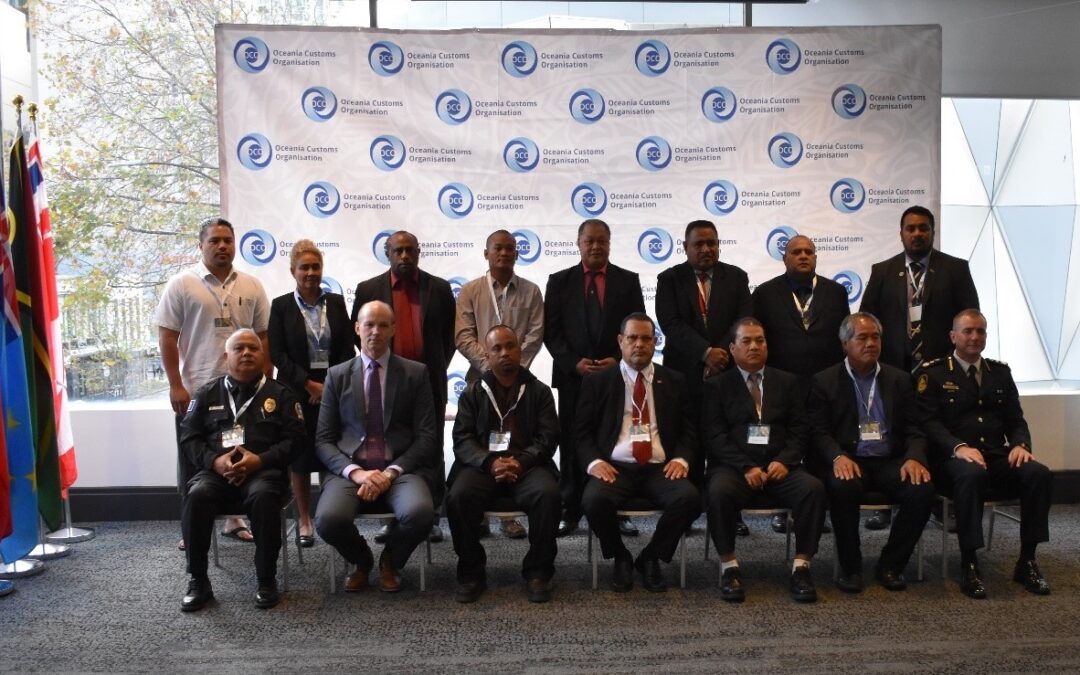The Oceania Customs Organisation (OCO) annual conference commenced on 11th June, 2018 in Melbourne, Australia, hosted by the Australian Border Force (ABF) with the theme “Strengthening regional connections to support a safe and prosperous Pacific”.
The Conference was opened with statements from ABF Commissioner, Mr. Michael Outram and the World Customs Organisation (WCO) Secretary General, Dr. Kunio Mikuriya. The annual conference is attended by 16 of the 23 OCO customs administrations and key partners including the WCO, ROCB Asia Pacific, Statistics New Zealand , IMF Pacific Financial and Technical Assistance Center (PFTAC), Pacific Immigration Directors’ Conference (PIDC) , Japan Customs, Pacific Transnational Crime Coordination Centre (PTCCC), Secretariat of the Pacific Community (SPC), United Nations Conference for Trade and Development (UNCTAD), World Bank Group, Her Majesty’s Customs and Excise, Pacific Island Forum Fisheries Agency, Asia Pacific Group on Money laundering, Statistics New Zealand, US Immigration and Customs Enforcement, United States Coast Guard, US Secret Service and JIATF West.
On Day 1, the Conference members witnessed 3 milestone achievements as follows:
1. Memorandum of Understanding on Customs Cooperation
Spearheaded by the ABF Commissioner, fifteen of the OCO members signed the MOU on Cooperation in Customs Matters. The aim of the MOU is to facilitate the exchange of information under relevant border security powers of individual member states. Subsidiary agreements between participating members will be required to satisfy the legal requirements of most states. These subsidiary agreements will provide means to strengthen security processes to maintain the sovereignty of our respective borders; expand trade facilitation; enhance risk management practices and improve cooperation. The information shared will cover areas relevant to border control, trade facilitation, organised crime, and revenue management.

2. Kiribati accedes to the WCO Revised Kyoto Convention
The Hon Natan Teewe, Minister of Justice of Kiribati deposited Kiribati’s instrument of accession to the International Convention on the Simplification and Harmonization of Customs Procedures (Revised Kyoto Convention) with the Dr. Kunio Mikuriya, WCO Secretary General on 11 June, 2018.
 Kiribati’s accession to the RKC makes the country the first non-WCO member in the world to accede to the RKC place them among the progressive countries that have ratified and are following international best practice for customs. In addition, the accessi on to the RKC and subsequent compliance with its provisions will greatly facilitate exporting and importing goods and services and related cross-border transactions, resulting in lower trade-related costs to business and increase investment in Kiribati.
Kiribati’s accession to the RKC makes the country the first non-WCO member in the world to accede to the RKC place them among the progressive countries that have ratified and are following international best practice for customs. In addition, the accessi on to the RKC and subsequent compliance with its provisions will greatly facilitate exporting and importing goods and services and related cross-border transactions, resulting in lower trade-related costs to business and increase investment in Kiribati.
Minister Teewe indicated Kiribati was undergoing a number of key reforms and their accession to the RKC demonstrates their level of commitment to harmonize customs procedures and will yield significant and measurable results by improving the effectiveness and efficient of Kiribati Customs. The WCO SG acknowledged Kiribati’s leadership and this has set the benchmark for the remaining OCO members in particular small islands states to undertake the same processes and contribute directly to the increasing the prosperity and welfare of their own economies and those of the OCO region and include membership of the WCO
3. Launch of the PACHS 17
The OCO launched the Pacific Harmonized Commodity Description and Coding System 2017 (PACHS 17) on 11th June, 2018.
The PACHS17 is a multipurpose goods nomenclature that forms the basis for Customs Tariffs and International Merchandise Trade Statistics. The PACHS17 is consistent on the 6th digit with the 2017 WCO HS and with the addition of the 7th and 8th digits subheadings as the “Regional Subheading.” 
The main objective of the PACHS17 is to establish uniformity in the classification of goods amongst members. PACHS17 has enabled all OCO members that are at different levels of implementing HS17 adopt a common benchmark and better reflect goods exported and imported by the Pacific region using a standardized system of names and codes.
The OCO would like to express their gratitude to the Statistics Development Division for SPC for collaborating with them to compile the PACHS17. The OCO is also grateful for the invaluable advice and guidance provided by the Customs Administrations and National Statistics Offices of the Pacific Island Countries and Territories, the World Customs Organisation (WCO), Charles Sturt University-Centre for Customs & Excise Studies, Pacific Islands Forum Secretariat, New Zealand Statistics, United Nations Statistics Division and the United Nations Conference for Trade and Development (UNCTAD). Last but not the least, the OCO would like to thank the Governments of Australia and New Zealand for their financial support to the Secretariat to enable the development and finalization of the PACHS17.
